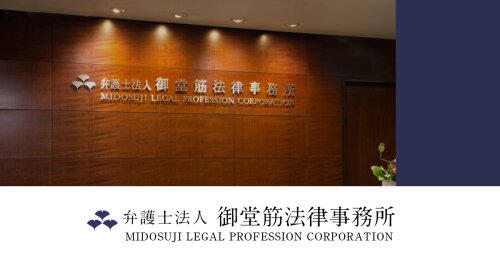Best Creditor Lawyers in Osaka
Share your needs with us, get contacted by law firms.
Free. Takes 2 min.
List of the best lawyers in Osaka, Japan
About Creditor Law in Osaka, Japan
Creditor law in Osaka, Japan concerns the rights and legal remedies available to individuals or entities owed money by others, known as debtors. This area of law covers how creditors can claim repayment, enforce claims through legal processes, and resolve disputes related to unpaid debts. Osaka, being a major economic hub, sees a significant volume of credit transactions, making creditor law an essential aspect of both business and personal financial dealings. Understanding creditor law is important for protecting your financial interests and ensuring compliance with local regulations.
Why You May Need a Lawyer
There are many situations in which a person or business in Osaka might need legal assistance concerning creditor matters. Some common scenarios include:
- Difficulty in recovering unpaid loans or invoices from individuals or businesses.
- Dealing with a debtor who disputes the amount owed or refuses to pay.
- Attempting to enforce court judgments or negotiate settlements.
- Uncertainty about the legal procedures for collecting debts in Japan.
- Involvement in bankruptcy proceedings or debt restructuring arrangements.
- Navigating cross-border debt collection if the debtor is located outside Japan.
- Protecting your rights when multiple creditors are involved.
- Ensuring compliance with Japanese consumer protection and privacy laws when contacting debtors.
A lawyer can help evaluate your case, explain your options, and guide you through the proper legal channels to resolve disputes efficiently and within the boundaries of the law.
Local Laws Overview
Credit and debt collection in Osaka is primarily governed by national Japanese laws, but there are local court procedures and practices to consider. Key aspects include:
- Civil Code of Japan: Outlines fundamental creditor rights, contractual obligations, and methods for recovering debts.
- Civil Execution Act: Details the procedures for enforcing judgments, such as wage or asset attachment and property seizure.
- Installment Sales Act and Money Lending Business Act: Regulate specific types of credit arrangements, including consumer loans, and set licensing requirements for lenders.
- Personal Information Protection Law: Limits the handling of debtor personal information, impacting how creditors contact debtors.
- Bankruptcy Law: Governs cases where debtors can no longer pay their debts and creditors must file claims or participate in distribution proceedings.
- Osaka District Courts: Have local jurisdiction for most creditor claims, including small claims and summary proceedings.
Since procedures and timelines can vary, and Japanese legal documents are often required, local legal counsel is invaluable for navigating these processes effectively.
Frequently Asked Questions
What should I do first if someone owes me money in Osaka?
Start by sending a written demand for payment. Keep detailed records of your communication and any agreements. If the debtor does not respond or refuses to pay, consult a lawyer to discuss legal options.
Can I charge interest or late fees on overdue payments?
You can charge interest if your contract specifies it, but rates are regulated by Japanese law to prevent excessive charges. If not outlined in your agreement, statutory interest rates may apply.
What legal options are available to recover a debt?
You can file a civil lawsuit or use summary court procedures for smaller amounts. If you win your case, you may use enforcement mechanisms like property seizure or wage garnishment.
How long do I have to file a lawsuit to recover a debt?
Statutes of limitation depend on the type of debt but are generally three to five years. Consult a lawyer to confirm the exact period for your case.
What happens if the debtor declares bankruptcy?
You must file a claim in the bankruptcy proceeding to be considered for payment from the debtor's assets. Priority is given to certain claims, so you may not recover the full amount owed.
Can I use a collection agency in Osaka?
Yes, but agencies must comply with the Money Lending Business Act and other regulations. It is important to choose reputable agencies to avoid legal problems.
Are there restrictions on contacting debtors?
Yes. Debtors have privacy rights. Harassment, threats, or public shaming are prohibited. Communications must follow consumer protection and privacy guidelines.
What documents do I need to pursue a claim?
Gather contracts, invoices, payment records, correspondence, and proof of the debt's existence. These are crucial for supporting your claim in court.
Can a creditor seize a debtor’s property without a court order?
No. Physical seizure or other enforcement actions require a court order following a formal legal process.
Do I need to attend court hearings in person?
In most cases, yes. However, your lawyer can sometimes represent you, especially for smaller claims. Check with your legal advisor for specific procedures.
Additional Resources
For those seeking more information or legal help regarding creditor matters in Osaka, the following resources may be useful:
- Osaka Bar Association: Provides lawyer referrals and legal consultations.
- Osaka District Court: Handles creditor and debt litigation.
- Legal Support Center (Houterasu): Offers information on legal procedures and may provide assistance for low-income individuals.
- Japanese Federation of Certified Public Tax Accountants' Associations: Can help with financial documentation and claims related to tax debts.
- Consumer Affairs Center Osaka: Advises on consumer credit and related disputes.
Next Steps
If you believe you have a claim as a creditor or are facing difficulties recovering a debt in Osaka, Japan, consider the following steps:
- Organize and review all documents related to the debt.
- Attempt direct communication and written requests for payment with the debtor.
- If informal efforts fail, consult a qualified lawyer specializing in creditor law in Osaka for a thorough assessment of your case.
- Prepare to provide evidence and attend meetings or hearings as required.
- Follow legal advice promptly to preserve your rights within applicable deadlines.
Navigating creditor law can be complex, especially in a different legal system. Professional assistance ensures you understand your rights, avoid procedural pitfalls, and improve your chances of a successful resolution.
Lawzana helps you find the best lawyers and law firms in Osaka through a curated and pre-screened list of qualified legal professionals. Our platform offers rankings and detailed profiles of attorneys and law firms, allowing you to compare based on practice areas, including Creditor, experience, and client feedback.
Each profile includes a description of the firm's areas of practice, client reviews, team members and partners, year of establishment, spoken languages, office locations, contact information, social media presence, and any published articles or resources. Most firms on our platform speak English and are experienced in both local and international legal matters.
Get a quote from top-rated law firms in Osaka, Japan — quickly, securely, and without unnecessary hassle.
Disclaimer:
The information provided on this page is for general informational purposes only and does not constitute legal advice. While we strive to ensure the accuracy and relevance of the content, legal information may change over time, and interpretations of the law can vary. You should always consult with a qualified legal professional for advice specific to your situation.
We disclaim all liability for actions taken or not taken based on the content of this page. If you believe any information is incorrect or outdated, please contact us, and we will review and update it where appropriate.











